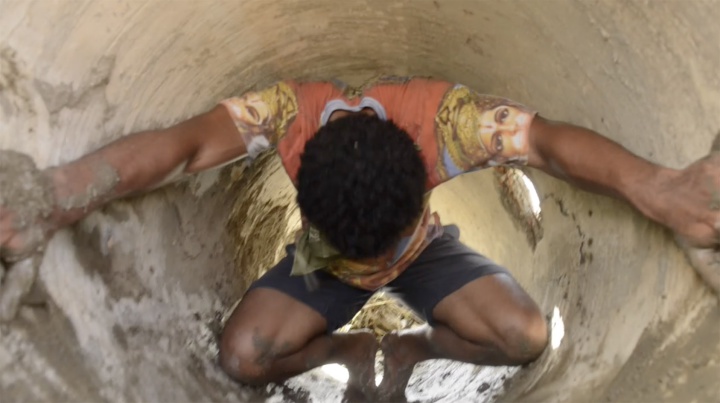Dancing in the street, on the beach, in refugee camps
MONDAY, SEPTEMBER 16, 2019

A feature-length
documentary film produced by Associate Professor Nicholas
Rowe of the Dance Studies programme, Dancing7Cities,
reclaims our right to dance, wherever we want.
The film was recently awarded Best Documentary Feature for the 2019 Rethink Dance Film Festival in the US, a festival dedicated to advancing human rights and social justice, and has been selected to screen at film festivals this year, in the US, Jordan, China and Palestine.
Dancing7Cities features community dance groups, from senior citizens to young refugees, exploring their hometowns through dance. It follows them dancing in alleyways, on public transport, through buildings and around public spaces in Lebanon, Fiji, Italy, Finland, Laos, Palestine and Australia.
The film was produced by Dr Rowe over nine years, initially conceived as a series of short films and a two-year project. It is also narrated by him. “Do we shape cities, or do cities shape us,” he asks in the film. “Our bodies are connected to the people, and the places that surround us. The architecture, public spaces, the cultures and histories, all prompt us to move in different ways.”
For Dancing7Cities he invited community dance groups to explore their own suburban environment through dance, to effectively “reanimate” their cities. The film captures their behind the scenes workshops, as they create and film dance, and follows them as they explore different parts of their cities to dance in. Rowe says, “They came up with a variety of ideas, and not necessarily the most beautiful locations; a train station, an alleyway, underneath the bridge. Places that were meaningful to them, where they could look at the physical possibilities of those locations, and what they could do there that they couldn’t do in a studio.”
Dr Rowe is a graduate of the Australian Ballet School, has choreographed and performed with the Finnish National Ballet, Australian Ballet, Sydney Dance Company, Royal New Zealand Ballet and more. In the last two decades he has worked as a community dance artist in a range of regions of the world, often with marginalised communities.
Filming, says Dr Rowe, removes the performance anxiety often associated a stage performance. “We did lot of workshops on using the camera, so people got used to the camera, and would disregard it. So it was about deconstructing that sense of performance.”
It was
also reclaiming people’s right to dance. People have
always danced, he says, but our inclination to dance has
been “whittled away by modern and classical dance
traditions. This is about reclaiming that legacy,
encouraging people to use dance to explore and respond to
their own urban environments.”
ends


 Emirates Team NZ: Emirates Team New Zealand Ranked #5 In Global Sports Technology Power List
Emirates Team NZ: Emirates Team New Zealand Ranked #5 In Global Sports Technology Power List Tātaki Auckland Unlimited: Discover The Treasures Of Tāmaki Makaurau - Making Māori Tourism Accessible To All
Tātaki Auckland Unlimited: Discover The Treasures Of Tāmaki Makaurau - Making Māori Tourism Accessible To All International Writers' Workshop NZ Inc: Ōtepoti Poets Top The Kathleen Grattan Prize For A Sequence Of Poems
International Writers' Workshop NZ Inc: Ōtepoti Poets Top The Kathleen Grattan Prize For A Sequence Of Poems NZ Amateur Sport Association: 22 Amendments Proposed For 2022 Act Lodged On 22 November
NZ Amateur Sport Association: 22 Amendments Proposed For 2022 Act Lodged On 22 November Auckland University of Technology: Reading Helps Children Face A Difficult Future
Auckland University of Technology: Reading Helps Children Face A Difficult Future PATHA: Puberty Blocker Evidence Brief Affirms Aotearoa’s Approach
PATHA: Puberty Blocker Evidence Brief Affirms Aotearoa’s Approach